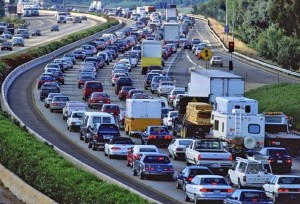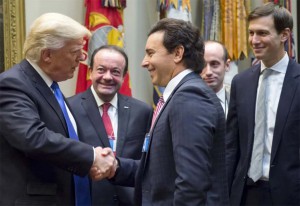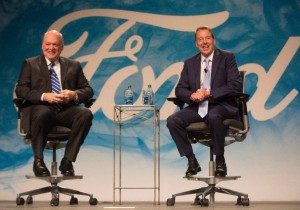The auto industry appears to be pulling back its support of the planned rollback in Obama-era fuel economy standards that the Trump Administration is expected to announce in the coming days.
Manufacturers are also putting pressure on the White House to work out a compromise with the State of California over its unique ability to set even tougher emissions and mileage standards. EPA chief Scott Pruitt had indicated a desire to eliminate the waiver first approved by Congress as part of the original 1970 Clean Air Act.
The industry about-face comes barely a year after top leaders raised concerns about the Corporate Average Fuel Economy standards during a meeting with then-new president — former Ford CEO Mark Fields warning the Obama target of 54.5 miles per gallon could cost 1 million jobs.
But some industry leaders now fear Trump’s anti-regulatory White House is set to go too far, a draft EPA memo indicating the agency wants to freeze the phase-in of CAFE at 2021 levels, about 25% below the original target. They’re also watching a potential consumer backlash and the legal challenges that could tie up any rollback in court making it difficult to plan for the future.
“We support standards that increase year over year that also are consistent with marketplace realities,” Mitch Bainwol, chief executive of the Alliance of Automobile Manufacturers, an industry trade group, was expected to say in his opening statement to a House of Representatives panel today.
(1 in 5 Americans wants to own an EV, finds AAA study. Click Here for more.)
Just a week ago, Ford Motor Co.’s top two executives tried to completely distance themselves from the position former CEO Fields had taken last year, Executive Chairman Bill Ford, and President and CEO Jim Hackett releasing a statement declaring, “We support increasing clean car standards through 2025 and are not asking for a rollback.”
Several Japanese manufacturers, including Honda and Nissan, had previously said they would continue targeting the original CAFE mandate whatever the EPA decided.
It’s not yet clear what the agency will do – and it also must get buy-in from the National Highway Traffic Safety Administration which, under the federal mileage statute, must jointly agree on any changes to CAFE.
But no matter what the administration ultimately decides, many observers question whether a cutback would take effect, at least anytime soon.
A coalition of 17 states, including California, and the District of Columbia have filed suit attempting to block any rollback and to prevent the White House from eliminating the Golden State’s ability to set its own, normally tougher, standards. Technically, California has the right to enact stiffer emissions rules, but there is an immutable relationship between carbon dioxide and fuel economy, so by dropping CO2 levels, California can force an increase in mileage. It has also set a minimum target for the sale of zero-emissions vehicles.
(For more on the lawsuit, Click Here.)
California itself is the largest car market in the country and with 12 other states adopting its standards, rather than the EPA’s, the tougher mileage target impacts nearly a third of the new vehicles sold in the U.S. each year. So, if the California waiver isn’t eliminated, industry analysts have noted, automakers would really have no choice but to continue on the status quo, whatever the EPA decided.
Mary Nichols, the head of the California Air Resources Board, has hinted of her willingness to compromise – but only if given a viable explanation for why mileage targets should be rolled back.
Automakers have another reason for backing away from the White House plan. Surveys have repeatedly shown that consumers favor increased mileage – even as they switch by the millions from small sedans and hatchbacks to more gas-hungry SUVs and pickups. And fuel economy is becoming a bigger concern as gas prices have begun surging back towards the $3-a-gallon mark.
(Rising demand, shrinking supply causing surge in fuel prices. Click Here for more.)
Aiming to shame the automakers – and take particular aim at Ford, a coalition of consumer and environmental groups, including the Sierra Club and Greenpeace, rolled into downtown Detroit Tuesday morning after a trip in from Washington, D.C. Activists drove up in what they described as a a “Dirty Ford,” a 2006 Focus sedan “that has been redesigned to feature a black cloud of pollution suspended on the car’s roof, a tailpipe fog machine and money spewing from the gas tank.”
The groups made its first stop at a point along the Detroit River where the Ford Motor Co. was originally incorporated.
“From climate change to higher gas bills, this Dirty Ford illustrates just some of the harms that Ford, Trump and Polluting Pruitt’s deregulation would impose on Americans,” said Madeline Page, campaign coordinator from Public Citizen, another group participating in the protest. “Our vehicle may be humorous, but the rollback it represents is deadly serious. I’m proud to be able to deliver messages from hundreds of thousands of Americans who are standing up to Ford.”
After holding a series of news conferences across the city, the group will end the day by delivering petitions containing 250,00 signatures to Ford World Headquarters in the Motor City suburb of Dearborn.




Mark Fields, instead of costing 1 million jobs it cost one million-dollar job…his.